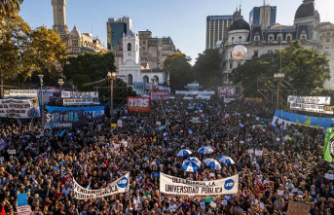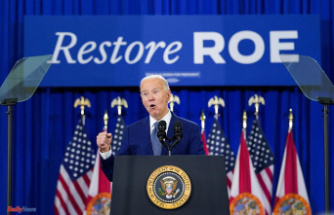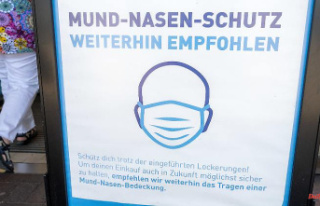Advertising posters with pictures of women wearing bridalwear were placed outside beauty parlours on the day that the Taliban took over Kabul, Afghanistan's capital. The Taliban also closed all salons in the city. Some businesses are promising to resume full service soon. Others fear for their future. Afsoon, a disguised make-up artist, describes the importance of Afghanistan's beauty industry to Afghan women.
It is difficult to translate the Dari expression takaankhordum into other languages.
It is a rare event in your life that shakes you to the core. After it, you will be forever changed.
Afsoon felt the sensation of takaan the first time he experienced it on 15 August 2021.
She woke up on Sunday morning to receive a call from her colleague at the beauty salon she worked at. Afsoon loved the scent of freshly shampooed nail polish and the buzz of a hairdryer.
Afsoon was told by her coworker that she shouldn't call today. "We are closing down. It's over."
Afsoon sat up in bed and checked her phone. As she scrolled through hundreds of posts on social media and dozens of text messages from family and friends, her thumb moved up and downwards on the screen. She felt both sick and freezing cold as a torrent of dread hit her.
They were the same message. The Taliban had already entered Afghanistan's capital Kabul. Within 16 days, the Western troops and diplomats had left Afghanistan.
She repeated to herself, "It's over." It was time for her to run.
Afsoon, who is now in her twenties, considers herself to be a modern Afghan woman.
She is passionate about social media and movies.
Afsoon doesn't recall the moment in the 90s when Taliban banned beauty salons.
She grew up in Afghanistan, where beauty parlours were an integral part of her daily life. Since 2001's US-led invasion of Afghanistan, there have been more than 200 beauty parlours in Kabul. There are hundreds more throughout the country.
She was a teenager and would browse magazines and social media looking for glamourous looks. As a young woman, she also visited salons with her family.
Everything about this world was a delight to her. Multi-coloured nail art, where make-up artists bent over ladies to paint smoky eyeliners. This was used to frame thick brushed eyelashes and highlight a sparkling sparkling makeup face. The shiny blow-dries and long, swishy hairstyles.
Afsoon realized her dream of becoming a successful makeup artist in one of these salons. She couldn't have asked for anything more.
Afsoon's beauty salon, like all Kabul beauty parlours, had its windows covered in posters featuring glamorous and elegant women promoting a promise for beauty inside.
These posters indicated that a person passing through Kabul's hot streets could not view inside Afsoon’s tranquil, multi-generational salon.
There would be more than 12 women in the salon at any given time, whether they were the stylists or clients. They ranged from journalists to doctors, singers and TV personalities to brides preparing for their big day, and teenage girls laughing with their mothers on a special bonding occasion.
The salon was always in good health, whether it was for weddings or just simple pampering.
"I love women. Afsoon explains, "I wanted to work and create spaces where women can shine." We could unwind in a space away from men.
Her years of hard work came to an abrupt halt on Sunday 15 Aug, when the Taliban took over Kabul's presidential palace.
Afsoon talks in a quiet tone to us, even though it's nearly midnight in Kabul. She is clearly afraid. She fled her home on Sunday to find a safe place.
She says, "Women in beauty industry, particularly people like me who were visible with their work are targets."
Afsoon was told by a friend that she should not go to work after he called her. He also said that anyone that depicted female beauty was being covered up by Kabul residents. A friend of Afsoons painted posters of models over himself to appease Taliban and not draw attention to his female friends who own beauty businesses.
She says that they wouldn't approve of unveiled faces or women with their necks exposed. They have always believed that women should not be the center of attention.
"It is the end for the beauty industry in Afghanistan."
Afsoon did not receive any invitations or paperwork to secure a seat on a plane far from Kabul.
There is no escape for her.
She maintains contact with her colleagues via a daily group chat. They received their last payment on 24 August. They will not receive any more payments. They have all agreed to close the parlour and not return to work.
Afsoon says she cannot speak about the future.
She's not sure what's next. She isn't sure what she will wear or when she will go outside.
She is currently in shock. The colour she had imagined for her future has been covered in black paint.
"Staying alive, is all I can think about." She says she isn't afraid of dying, but not in the way that makes her feel hopeless and terrified.
"Every second, I feel like the Taliban will be there for me."
Afghanistan is ranked as one of the most dangerous countries for women to live in. According to one study, 87% of Afghan women are victims of domestic violence. Sodaba Haidare visited Kabul's capital to see if there is any hope for women who are escaping abuse. Published April 2017.
Afghan survivors run the Afghan restaurant












